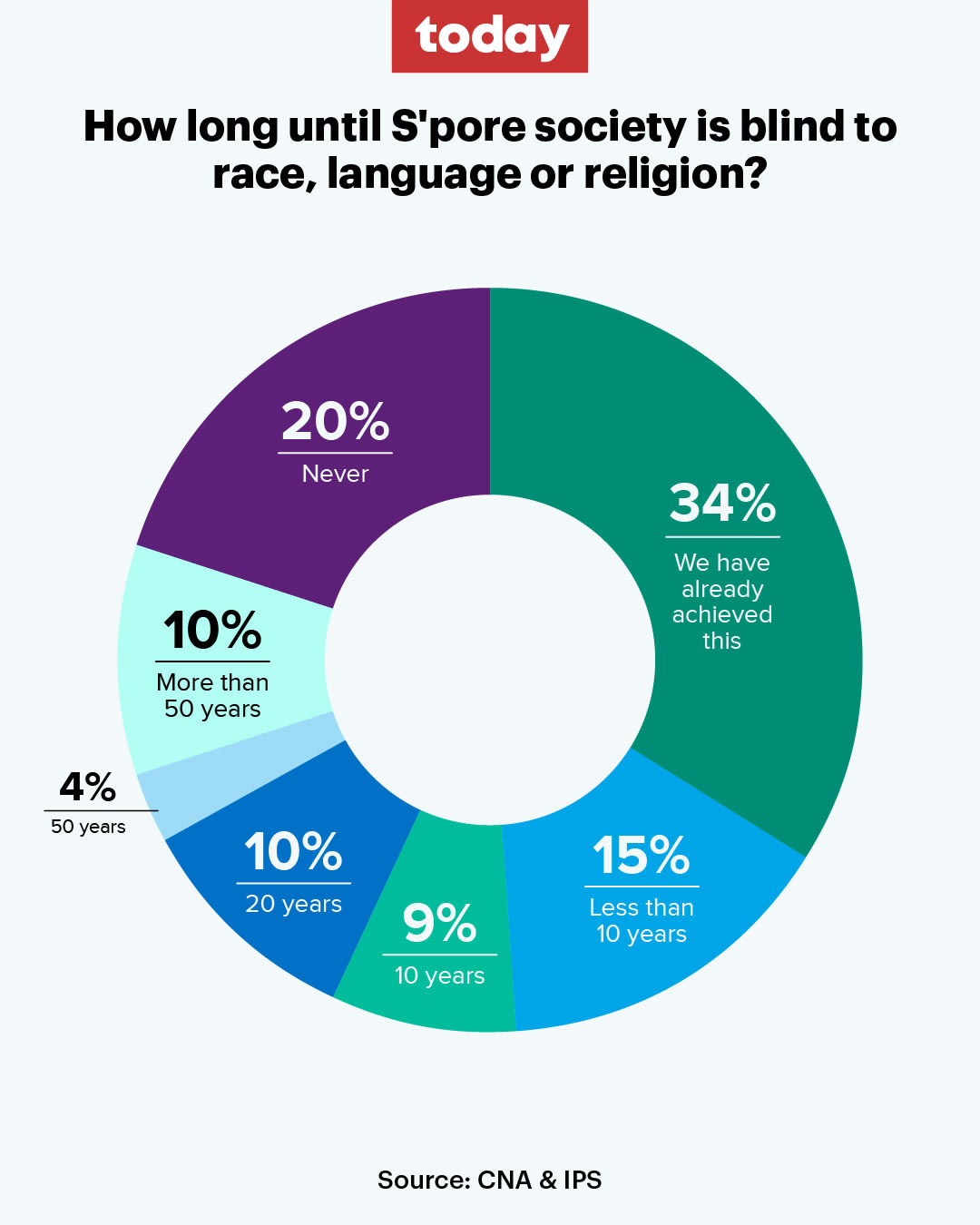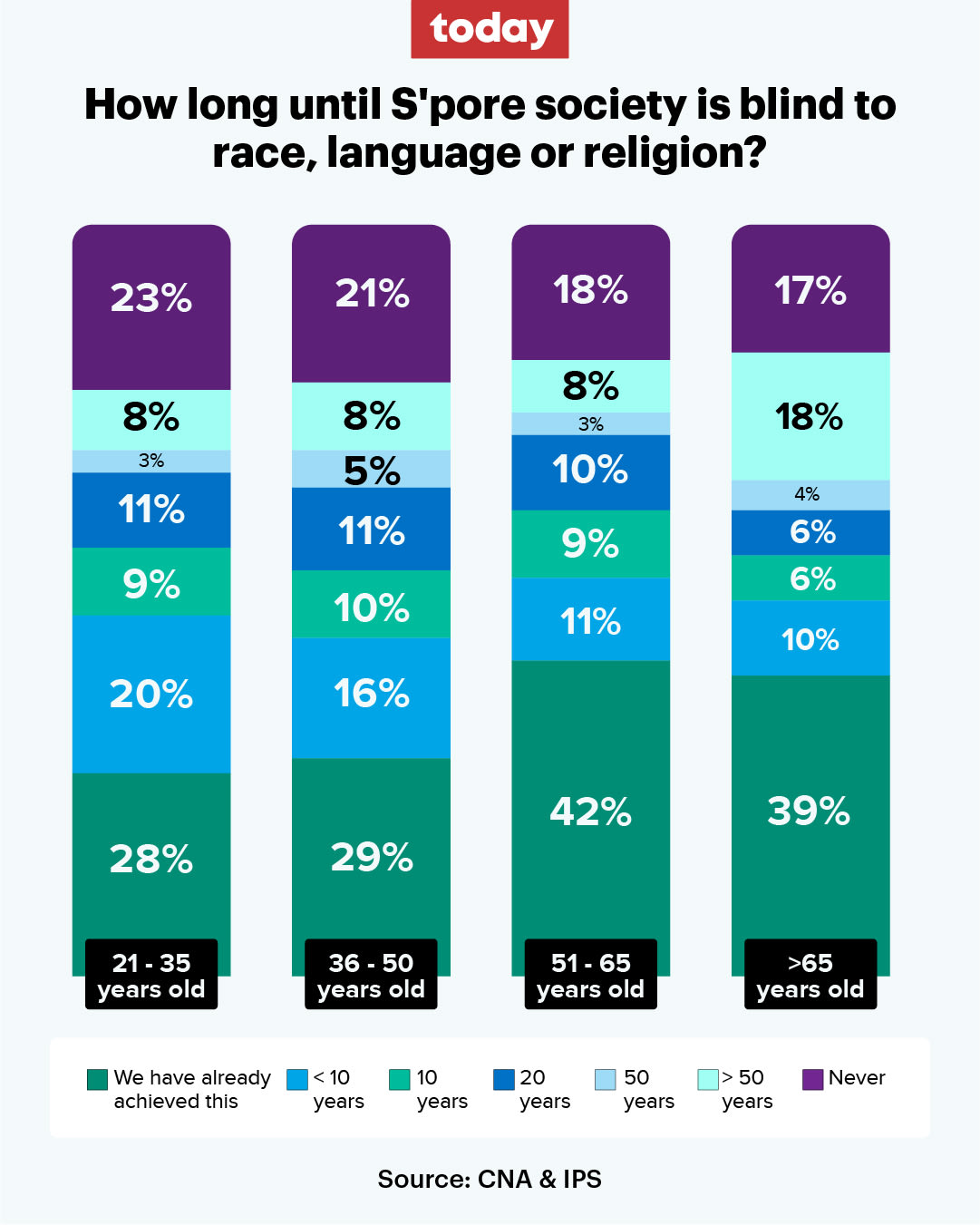CNA-IPS survey finds generational divide in views on existence of racial discrimination, dealing with racism
SINGAPORE — About a third (34 per cent) of Singaporeans and permanent residents believe racial discrimination no longer exists in the country, while a similar proportion (30 per cent) shared a polar opposite view. That is, they either believe racial discrimination will never be eradicated, or it may take 50 years or more.

- A joint survey was conducted by CNA and the Institute of Policy Studies to poll Singaporeans and permanent residents about race and religion
- About a third of S'poreans and PRs believe racial discrimination no longer exists, while a similar proportion shared a polar opposite view
- The survey also showed that there was a clear generational divide on whether society has eliminated racial discrimination
- Older respondents generally felt it has already been achieved, a sentiment fewer younger Singaporeans agreed with
SINGAPORE — About a third (34 per cent) of Singaporeans and permanent residents believe racial discrimination no longer exists in the country, while a similar proportion (30 per cent) shared a polar opposite view. That is, they either believe racial discrimination will never be eradicated, or it may take 50 years or more.
These findings are from a joint survey conducted by regional news outlet CNA and the Institute of Policy Studies (IPS), and they are generally consistent across respondents of different races.
Some 2,000 people, aged 21 and above, were polled, among other topics, on how long they felt it may take before there is no longer racial discrimination in Singapore, and whether society has truly become, as the national pledge goes, “regardless of race, language, or religion”.
Those who said such an ideal is possible, but gave more optimistic time frames such as 10 years (9 per cent), 20 years (10 per cent) and 50 years (4 per cent) were generally in the minority, the survey found.
Last conducted in 2016, the latest CNA-IPS Survey on Race Relations is a demographically representative face-to-face poll carried out between November 2021 and January this year.
Respondents were asked questions related to race and religion, and the results formed the basis of a two-part documentary that was aired on CNA on Thursday (March 31) and Friday.
GENERATIONAL DIVIDE
The survey also showed that there was a clear generational divide on whether society has eliminated racial discrimination.
For instance, about two in five (around 40 per cent) of the respondents from each of the two oldest groups — 51 to 65 years old, and those above 65 — felt that Singapore has already achieved this.
In contrast, a much smaller proportion of the two younger age groups — 21 to 35 (28 per cent) and 36 to 50 (29 per cent) — felt this way.
There were other examples that showed how older respondents differed from their younger counterparts when it came to topics related to racism, such as being less willing to call it out when encountered and being tired of public dialogues about race.
The IPS researchers said in a paper based on the findings that there is no consensus on the age at which people become aware of racial differences and develop racial biases.
Over a quarter (27 per cent) of the respondents believe it happens between the age of seven and 17, while another 18 per cent believe it happens slightly later, between 18 and 35.
Older respondents, they said, are “more likely to think that racial biases never develop”.
The authors of the paper are: Dr Mathew Mathews, the principal research fellow at IPS and the institute’s Social Lab research centre; Dr Teo Kay Key, a research fellow at the Social Lab; and Ms Samantha Nah, a research assistant at the Social Lab.

SPEAKING UP ON RACISM
On whether it would be beneficial for society if people felt able to speak freely about their ethnic identity not being properly respected, or about problems with different ethnic cultures, the researchers found that Singaporeans have mixed sentiments.
About half (48 per cent) thought this would be good or very good, while most of the rest felt it would make no difference.
The results were roughly similar for the question of whether it would be good to have a national consensus on what constitutes racism (51 per cent).
The researchers said that overall, “these results indicate ambivalence about greater and more open national discourse about racial issues”.
That said, Indians were much more likely than other races to think having a national consensus on what constitutes racism would be good or very good for society.
About 59 per cent of them felt this way, compared to 52 per cent of Chinese and 45 per cent of Malays.
IMPROVING CROSS-CULTURAL UNDERSTANDING
The respondents were also asked questions related to what they felt would be either good or bad for more inter-ethnic interaction and understanding.
The statement: “People have free choice of which mother tongue(s) to learn” saw the highest proportion of respondents agreeing it would be “good” or “very good” (63 per cent) compared to three other statements.
This was followed by:
- “People have a deeper understanding of one another’s culture” (63 per cent)
- “People more commonly learn the language of another ethnic group” (59 per cent)
- “There are more inter-racial marriages” (46 per cent)

TO ABOLISH THE CMIO FRAMEWORK OR NOT?
The respondents were also posed a number of questions about whether developments to Singapore’s Chinese-Malay-Indian-Others (CMIO) framework of race would be good or bad for society.
About half of all respondents thought none of these developments would make a difference.
The researchers said that the highest level of support was for Singapore to officially recognise other cultures apart from Chinese, Malay, Indians and Eurasians, with 49 per cent indicating that this would be good or very good.
A roughly similar proportion, 42 per cent, supported this kind of move, in terms of identity documents allowing for categorisations like Peranakan, Javanese and others — cultures which currently get subsumed under the Chinese or Malay categories.
On whether Singapore’s CMIO framework of race should remain, only about three in 10 of the respondents felt it should be abolished.
A larger proportion of Indians (45 per cent) supported this sentiment more than the Chinese (29 per cent), Malays (33 per cent) or those from other ethnic backgrounds (22 per cent).
In spite of this, more than half (54 per cent) of the respondents indicated it would be beneficial to identify themselves as Singaporeans without considering race.
However, only about three in 10 felt positive that Singaporeans should mostly speak English, rather than their mother tongue.
“Thus, although respondents are fine with abstract changes in one’s identity, they are less comfortable with other implications of moving past racial and cultural differences,” said the researchers.
WORKPLACE DISCRIMINATION
When it comes to the workplace, respondents were less accepting of Singaporean Malays and Indians as bosses.
While 89 per cent of respondents were fine with Malays as their colleagues, only 75 per cent would accept them as bosses.
Similarly, while 87 per cent of the respondents were accepting of Indians as colleagues, only 74 per cent would accept them as bosses.
Respondents showed a high acceptance for Singaporean Chinese as their bosses and colleagues, with figures for both above 95 per cent.
Respondents were less accepting of new citizens as their bosses and colleagues, particularly those from the region.
While the respondents were open to having a new citizen of western origin as a boss (63 per cent), they were less so of new citizens from China (55 per cent) and India (51 per cent).
Respondents were more accepting of having new citizens as colleagues, but preferred working alongside those of western origin (74 per cent) or from China (74 per cent) over India (70 per cent).
RACIAL ATTITUDES WHEN IT COMES TO RENTING OUT PROPERTY
The survey found that new citizens from India were the least preferred as rental tenants, be it as tenants of a spare room or of the entire property.
Only 32 per cent of respondents said they would rent a spare room in their home to a new citizen from India, compared to 48 per cent from China and 45 per cent of those who are of western origin.
And while more than half were willing to rent a property to new citizens from China (57 per cent) and those of western origin (59 per cent), less than half (44 per cent) were willing to have new citizens from India as tenants.
When it comes to local tenants, most respondents said they were willing to rent their room out to a Singaporean Chinese (90 per cent), while only half of them were willing to consider Singaporean Malays (51 per cent) and Indians (45 per cent) as tenants.
The figures were similar when respondents were asked about renting out their whole property. While 92 per cent would take Singaporean Chinese as tenants, just above half were willing to accept Singaporean Malays (62 per cent) and Singaporean Indians (58 per cent).











